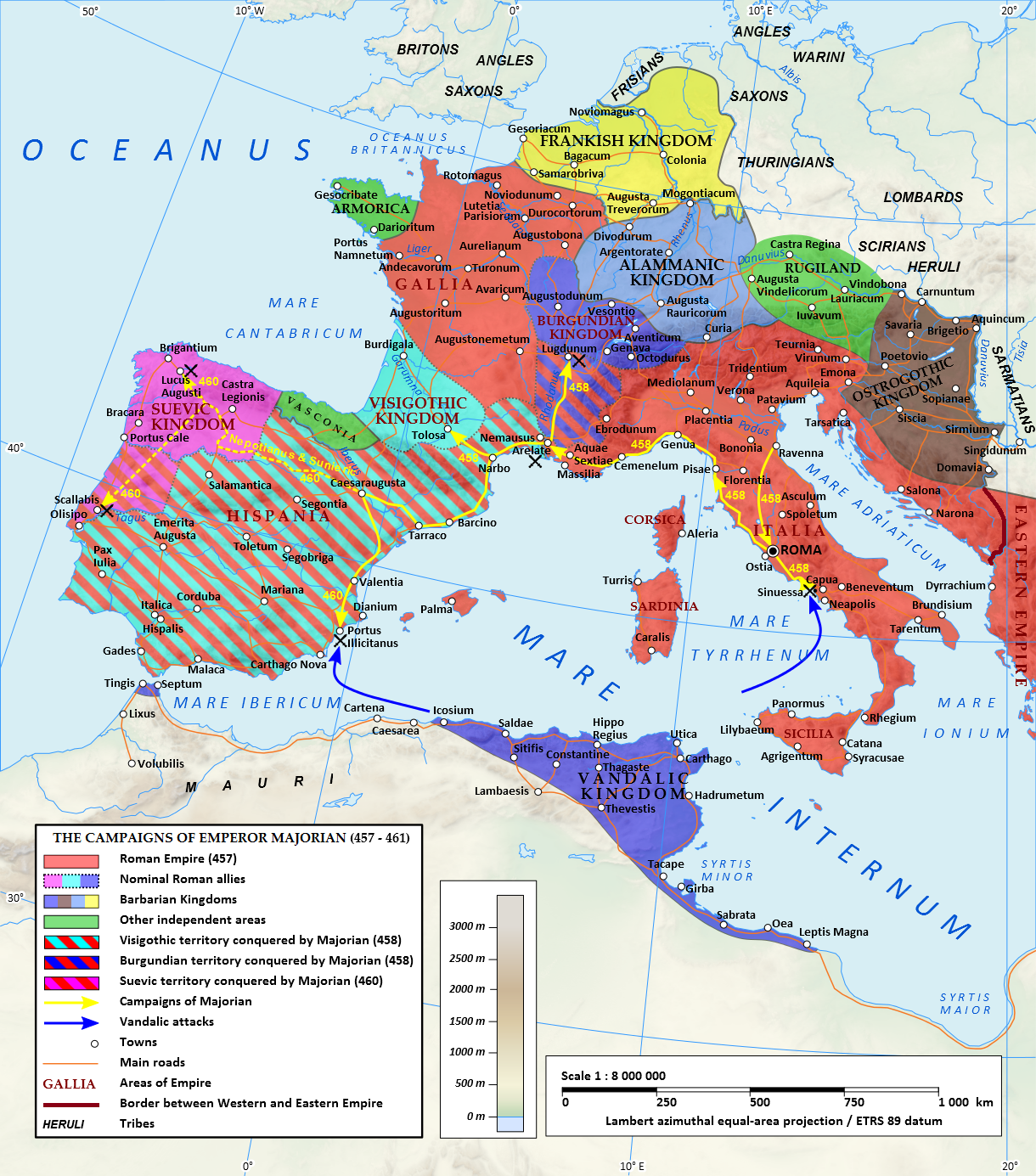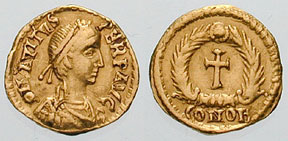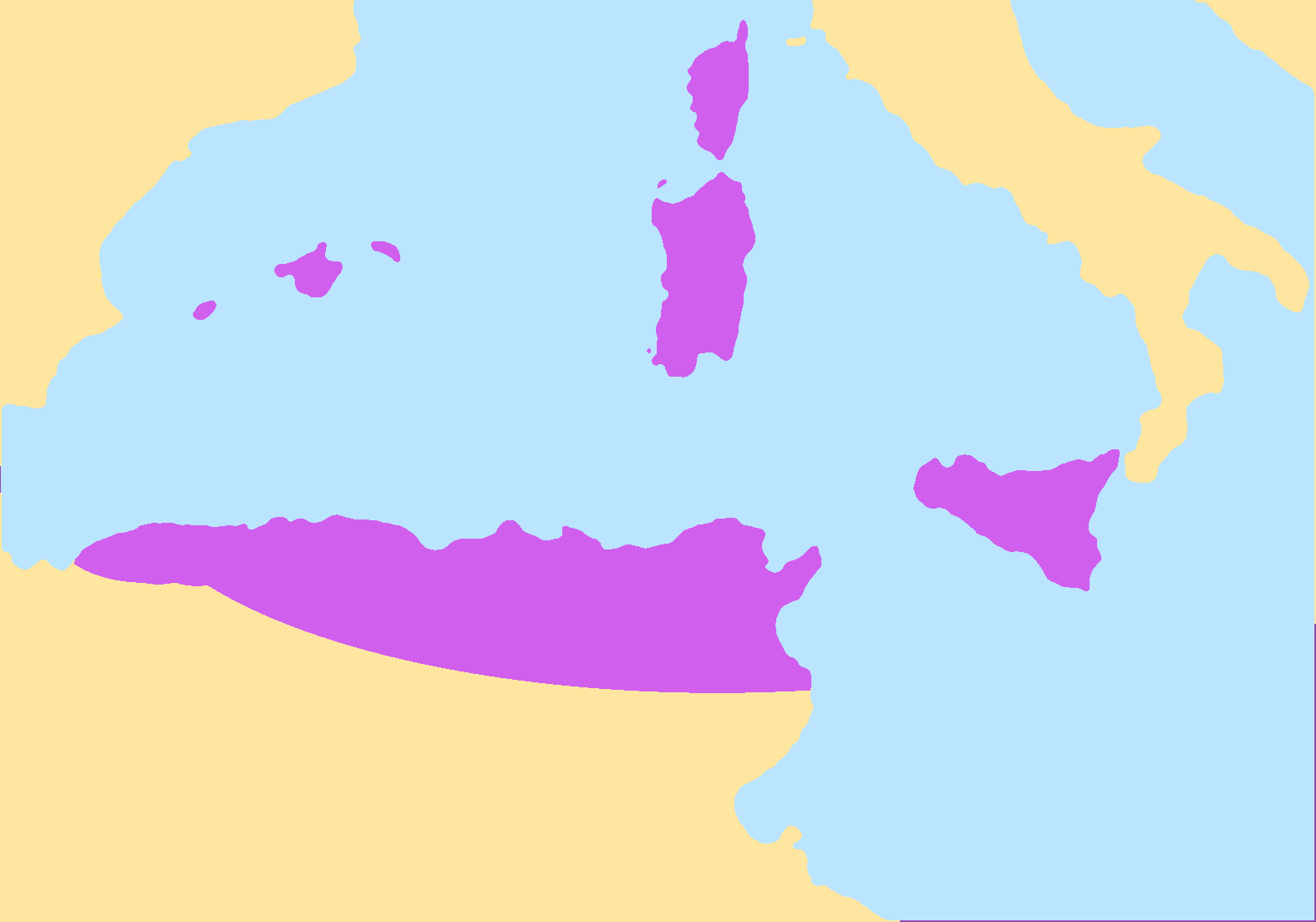|
Majorian
Majorian (; 7 August 461) was Western Roman emperor from 457 to 461. A prominent commander in the Late Roman army, Western military, Majorian deposed Avitus in 457 with the aid of his ally Ricimer at the Battle of Placentia (456), Battle of Placentia. Possessing little more than Roman Italy, Italy and Dalmatia (Roman province), Dalmatia, as well as some territory in Hispania Tarraconensis, Hispania and northern Roman Gaul, Gaul, Majorian campaigned rigorously for three years against the Empire's enemies. In 461, he was murdered at Dertona in a conspiracy, and his successors until the Fall of the Western Roman Empire, fall of the Empire in 476 were puppets either of barbarian generals or the Byzantine Empire, Eastern Roman court. After Battle of Garigliano (457), defeating a Vandal attack on Italy in 457, Majorian intercepted the Visigoths in the Battle of Arelate, defeating them and saving the city. Securing Septimania, he reduced the Goths to Foederati, federate status, returning ... [...More Info...] [...Related Items...] OR: [Wikipedia] [Google] [Baidu] |
Western Roman Empire
In modern historiography, the Western Roman Empire was the western provinces of the Roman Empire, collectively, during any period in which they were administered separately from the eastern provinces by a separate, independent imperial court. Particularly during the period from AD 395 to 476, there were separate, coequal courts dividing the governance of the empire into the Western provinces and the Eastern provinces with a distinct Line of hereditary succession, imperial succession in the separate courts. The terms Western Roman Empire and Byzantine Empire, Eastern Roman Empire were coined in modern times to describe political entities that were ''de facto'' independent; contemporary Ancient Rome, Romans did not consider the Empire to have been split into two empires but viewed it as a single polity governed by two imperial courts for administrative expediency. The Western Empire collapsed in 476, and the Western imperial court in Ravenna disappeared by AD 554, at the end of Ju ... [...More Info...] [...Related Items...] OR: [Wikipedia] [Google] [Baidu] |
Ricimer
Ricimer ( , ; – 19 August 472) was a Romanized Germanic general, who ruled the remaining territory of the Western Roman Empire from 456 after defeating Avitus, until his death in 472, with a brief interlude in which he contested power with Procopius Anthemius. Deriving his power from his position as ''magister militum'' of the Western Empire, Ricimer exercised political control through a series of puppet emperors. Ricimer's death led to unrest across Italy and the establishment of a Germanic kingdom on the Italian Peninsula. Lineage The date of Ricimer's birth is unknown. Some scholars have dated it as late as the early 430s, which would have made him unusually young when he rose to power. A birthdate of around 418 is more likely. The names of his parents are also unknown. In his panegyric to Anthemius, given in 468, the poet Sidonius Apollinaris claimed that Ricimer was Suevic on his father's side and Visigothic on his mother's, specifying that his maternal grandfathe ... [...More Info...] [...Related Items...] OR: [Wikipedia] [Google] [Baidu] |
Libius Severus
Libius Severus, sometimes enumerated as Severus III, was Western Roman Empire, Western Roman emperor from November 19, 461 to his death on November 14, 465. A native of Lucania,Cassiodorus, ''Chronicle''; ''Chronica Gallica of 511'', s:la:Chronica gallica a. dxi#636, 636. Severus was the fourth of the so-called "Shadow Emperors" who followed the deposition of the Valentinianic dynasty in 455. He ruled for just under four years, attaining the throne after his predecessor, Majorian, was overthrown by his ''magister militum'', Ricimer. Severus was the first of a series of emperors who were highly dependent on the general, and it is often presumed that Ricimer held most of the ''de facto'' power during Severus' reign Severus' reign was marked by diplomatic tension and an erosion of Rome's control over the non-Italian provinces. Diplomatically, Severus failed to secure the Byzantine Empire, eastern emperor Leo I (emperor), Leo's recognition, and the alliance Majorian had made with Van ... [...More Info...] [...Related Items...] OR: [Wikipedia] [Google] [Baidu] |
Battle Of Placentia (456)
The Roman Civil War of 456 was a civil war fought in the Western Roman Empire during the second half of 456 AD. The Roman generals Majorianus and Ricimer revolted against the Western Roman emperor Avitus who was appointed by the Visigoths after the Sack of Rome in 455. Avitus went to Gaul to gather support for his rule which he lacked from the Roman Senate and people. Avitus was defeated by the stronger rebel army at a battle in Piacenza, deposed as emperor, and died shortly thereafter in mysterious circumstances. Eastern Roman emperor Leo I appointed Majorianus and Ricimer as ''magister militum'' before Majorianus appointed himself Western emperor with support from the Senate and army. Sources For the events in the Western Roman Empire in the period after the death of Valentinian III (455), historians have only scarce chronicles and fragments from historiography at their disposal. In addition, the Panegyric of Sidonius Apollinaris about Avitus and his letters provides important ... [...More Info...] [...Related Items...] OR: [Wikipedia] [Google] [Baidu] |
Fall Of The Western Roman Empire
The fall of the Western Roman Empire, also called the fall of the Roman Empire or the fall of Rome, was the loss of central political control in the Western Roman Empire, a process in which the Empire failed to enforce its rule, and its vast territory was divided among several successor polities. The Roman Empire lost the strengths that had allowed it to exercise effective control over its Western provinces; modern historians posit factors including the effectiveness and numbers of the army, the health and numbers of the Roman population, the strength of the economy, the competence of the emperors, the internal struggles for power, the religious changes of the period, and the efficiency of the civil administration. Increasing pressure from invading peoples outside Roman culture also contributed greatly to the collapse. Climatic changes and both endemic and epidemic disease drove many of these immediate factors. The reasons for the collapse are major subjects of the hi ... [...More Info...] [...Related Items...] OR: [Wikipedia] [Google] [Baidu] |
Avitus
Eparchius Avitus (died 456/7) was Roman emperor of the Western Roman Empire, Western Empire from July 455 to October 456. He was a Roman Senate, senator of Roman Gaul, Gallic extraction and a high-ranking officer both in the civil and military administration, as well as Roman Catholic Diocese of Piacenza-Bobbio, Bishop of Piacenza. He opposed the reduction of the Western Roman Empire to Roman Italy, Italy alone, both politically and from an administrative point of view. For this reason, as Emperor he introduced several Gallic senators in the Imperial administration; this policy, however, was opposed by the senatorial aristocracy and by the people of Rome, who had suffered from the sack of Rome (455), sack of the city by the Vandals in 455. Avitus had a good relationship with the Visigoths, in particular with their king Theodoric II, who was a friend of his and who acclaimed Avitus Emperor. The possibility of a strong and useful alliance between the Visigoths and Romans faded, h ... [...More Info...] [...Related Items...] OR: [Wikipedia] [Google] [Baidu] |
Battle Of Arelate
The Battle of Arles was fought in 458 near Arelate (Arles) between Western Roman Emperor Majorian and Visigothic king Theodoric II. After the assassination of Flavius Aetius in 454, the Visigoths began to expand their kingdom at the expense of the crumbling Roman administration in Gaul and Hispania. When Majorian became emperor in 457, the Visigoths under king Theodoric II had just recently defeated the Suebic Kingdom in north-west Hispania and were consolidating their hold on the rest of the Iberian Peninsula The Iberian Peninsula ( ), also known as Iberia, is a peninsula in south-western Europe. Mostly separated from the rest of the European landmass by the Pyrenees, it includes the territories of peninsular Spain and Continental Portugal, comprisin .... Majorian, a young, capable general in his late thirties, inherited a collapsing empire consisting of only Italy, Dalmatia, and some fractured territories in northern Gaul. He decided the first step towards consolidatin ... [...More Info...] [...Related Items...] OR: [Wikipedia] [Google] [Baidu] |
Marcellinus (magister Militum)
Marcellinus (died August 468) was a Roman general and patrician who ruled over the region of Dalmatia in the Western Roman Empire and held sway with the army there from 454 until his death. Governing Dalmatia both independently from, and under, six Emperors during the twilight of the Western Empire, Marcellinus proved to be an able administrator and military personality with sources making reference that he ruled justly and well and kept Dalmatia independent of the emperor and of barbarian rulers. Life Origins Marcellinus was said to have been of good birth and character and to have had a good education, he was also a devout pagan, and is alleged to have been a skilled soothsayer. Nothing is known of Marcellinus' early life; records first mention his name in 454 when he rebelled against Western Emperor Valentinian III following his murder and assassination of Flavius Aëtius who was Marcellinus' friend. He was in Dalmatia at the time and is believed to have held the title of '' ... [...More Info...] [...Related Items...] OR: [Wikipedia] [Google] [Baidu] |
Leo I (emperor)
Leo I (; 401 – 18 January 474), also known as "the Thracian" (; ), was Eastern Roman emperor from 457 to 474. He was a native of Dacia Aureliana near historic Thrace. He is sometimes surnamed with the epithet "the Great" (; ), probably to distinguish him from his young grandson and co-''augustus'' Leo II (). During his 17-year rule, he oversaw a number of ambitious political and military plans, aimed mostly at aiding the faltering Western Roman Empire and recovering its former territories. He is notable for being the first Eastern Emperor to legislate in Koine Greek rather than Late Latin. He is commemorated as a saint in the Eastern Orthodox Church, with his feast day on 20 January. Reign He was born in Thracia or in Dacia Aureliana province in the year 401 to a Thraco-Roman family. His Dacian origin is mentioned by Candidus Isaurus, while John Malalas believes that he was of Bessian Thracian stock. According to the '' Patria of Constantinople'' he had one siste ... [...More Info...] [...Related Items...] OR: [Wikipedia] [Google] [Baidu] |
Sidonius Apollinaris
Gaius Sollius Modestus Apollinaris Sidonius, better known as Sidonius Apollinaris (5 November, 430 – 481/490 AD), was a poet, diplomat, and bishop. Born into the Gallo-Roman aristocracy, he was son-in-law to Emperor Avitus and was appointed Urban prefect of Rome by Emperor Anthemius in 468. In 469 he was appointed Bishop of Clermont and he led the defence of the city from Euric, King of the Visigoths, from 473 to 475. He retained his position as bishop after the city's conquest, until his death in the 480s. He is venerated as a saint in the Catholic church, the Orthodox Church, and the True Orthodox Church, with his feast day on 21 August. Sidonius is "the single most important surviving author from 5th-century Gaul" according to Eric Goldberg. He is one of four Gallo-Roman aristocrats of the 5th- to 6th-century whose letters survive in quantity; the others are Ruricius, bishop of Limoges (died 507), Alcimus Ecdicius Avitus, bishop of Vienne (died 518) and Magnus Felix En ... [...More Info...] [...Related Items...] OR: [Wikipedia] [Google] [Baidu] |
Battle Of Garigliano (457)
The Battle of Garigliano was fought between the Vandals and the Western Roman Empire in Campania, Italy in 457. After having seized Carthage and made it the capital of their kingdom in 439, the Vandals frequently raided the territories of the Western Roman Empire. In 457, the new emperor Majorian surprised a Vandal-Berber Berber or Berbers may refer to: Ethnic group * Berbers, an ethnic group native to Northern Africa * Berber languages, a family of Afro-Asiatic languages Places * Berber, Sudan, a town on the Nile People with the surname * Ady Berber (1913–196 ... raiding party which was returning with loot from Campania. They were engaged at the mouth of the river Garigliano. Many of the raiders were slaughtered before they could reach their ships or were driven into the sea and drowned.Sidonius Apollinaris, Carmina, V.385–440 and A. Loyen, Recherches historiques sur les panégiriques de Sidonine Apollinaire, Paris 1942, pp. 76–77 and note 5. Cited in Savino, Eliod ... [...More Info...] [...Related Items...] OR: [Wikipedia] [Google] [Baidu] |
Burgundians
The Burgundians were an early Germanic peoples, Germanic tribe or group of tribes. They appeared east in the middle Rhine region in the third century AD, and were later moved west into the Roman Empire, in Roman Gaul, Gaul. In the first and second centuries AD, they or a people with the same name were mentioned by Roman writers living west of the Vistula river, in the region of Germania, which is now part of Poland. The Burgundians were first mentioned near the Rhine regions together with the Alamanni as early as the 11th panegyric to Emperor Maximian given in Trier in 291 AD, referring to events that must have happened between 248 and 291, and these two peoples apparently remained neighbours for centuries. By 411 AD, Burgundians had established control over Roman cities on the Rhine, between Franks and Alamanni, including Worms, Germany, Worms, Speyer and Strasbourg. In 436 AD, Flavius Aetius, Aëtius defeated the Burgundians on the Rhine with the help of Huns, Hunnish forces, ... [...More Info...] [...Related Items...] OR: [Wikipedia] [Google] [Baidu] |







